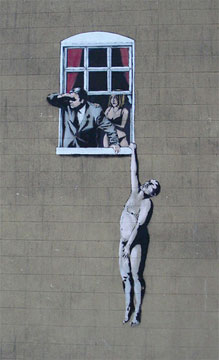به زبان فارسی
PICTORY
LATEST MUSIC
SEARCH
Newspapers & Cigarettes
by Niloo Sarabi
14-Mar-2011
Kal-Abbas is mad.
Stark naked, like the day he was born, he runs out of his tattered house into the street, hollering at the top of his lungs. He curses at the people, as they try to get out of his way. When he sees women, Kal-Abbas stands still, leering. They scream and run away, holding on tighter to their chadors. He yells and runs after them, schlepping his bare feet over the hot and dusty asphalt. The neighborhood kids stop playing ball and follow him, laughing and screaming: “Divooneh! Divooneh ” Kal-Abbas beats his chest and wiggles his wrinkled penis, repeating: “Divooneh! Divooneh!”
His curly salt-and-pepper hair is overgrown and disheveled, his face, unshaven. His daughters run after him. “Baba,” they say, holding his hand tight, “Let’s go home.” They are pretty. Kal-Abbas has two daughters — one is a schoolteacher, the other a nurse. They curse at us; throw stones at us, “Go away, leave him alone!”
“He doesn’t want to take his pills,” his wife tells my mother, as she squats down next to the small pond in our basement and scrubs my father’s shirts in the green plastic tub. When Kal-Abbas was a young physician, Robab-Khanoom says to mother, he joined the sanitation army and worked in the villages. They were moaning and crying all day, sick women and children, sitting on the floor in the stuffy crowded room waiting for their turn. Kal-Abbas brought so many babies into this world. They buried the dead ones and their mothers at dawn in the village cemetery, next to the deserted schoolroom. Later they buried many more when the fever came. The sanitation army had left for the city when Kal-Abbas fell ill.
Mother likes Robab-Khanoom, but tells me to stay away from the street on hot summer afternoons, when Kal-Abbas is out. I sneak out when she and father take a nap. When Kal-Abbas’s emaciated, bare body emerges from the narrow alley, we stop riding our bikes and run after him. He waves his frayed shirt in the air like a flag and aimlessly paces the sidewalk. Newspapers and cigarettes are what he likes most in the world. Mother keeps father’s newspapers in a box and gives them to Robab-Khanoom when she comes over on Wednesdays. Sometimes she buys a carton of Eshno cigarettes and puts it on top of the pile.
“Next summer I’ll take him to the shrine of his holiness, Imam Hossein,” Robab-Khanoom tells mother, as she stacks the wet shirts in a tray and lets the murky soap water drain into the empty pond. She took him to Karbala once before, that’s how Kal-Abbas got his name in the first place—Kal, Abbas. “His holiness will grant him health,” she says, rinsing her swollen hands under running water, “this time, he will.”
RECENT COMMENTS
IRANIANS OF THE DAY
| Person | About | Day |
|---|---|---|
| نسرین ستوده: زندانی روز | Dec 04 | |
| Saeed Malekpour: Prisoner of the day | Lawyer says death sentence suspended | Dec 03 |
| Majid Tavakoli: Prisoner of the day | Iterview with mother | Dec 02 |
| احسان نراقی: جامعه شناس و نویسنده ۱۳۰۵-۱۳۹۱ | Dec 02 | |
| Nasrin Sotoudeh: Prisoner of the day | 46 days on hunger strike | Dec 01 |
| Nasrin Sotoudeh: Graffiti | In Barcelona | Nov 30 |
| گوهر عشقی: مادر ستار بهشتی | Nov 30 | |
| Abdollah Momeni: Prisoner of the day | Activist denied leave and family visits for 1.5 years | Nov 30 |
| محمد کلالی: یکی از حمله کنندگان به سفارت ایران در برلین | Nov 29 | |
| Habibollah Golparipour: Prisoner of the day | Kurdish Activist on Death Row | Nov 28 |




Excellent!
by Azarin Sadegh on Tue Mar 15, 2011 12:02 AM PDTI second JJ! More please!
Wonderful writing...great details and images!
Looking forward to reading more from you! Azarin
More please
by Jahanshah Javid on Mon Mar 14, 2011 11:18 PM PDTVery well written. I wanted to read more. I was into the characters.